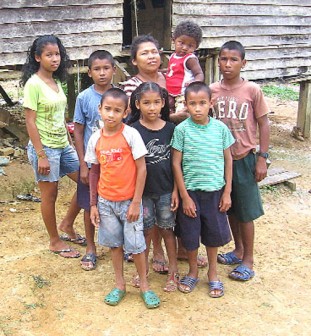A single-mother with six school-aged children and earning less than $50,000 a month, Mortlyn Benjamin and her family may be ideal candidates to benefit from the government’s One Laptop Per Family (OLPF) initiative.
However, it is not clear if her family and the many others who may also qualify in Port Kaituma will benefit. Before speaking to Stabroek News, Henry had never heard of the OLPF programme. “Is the first time I hearing about it but if the government give me a computer I know it will help me children,” Benjamin said, after the initiative was explained to her. And although neither she nor her children has ever used a computer and they are currently without electricity, she still wants one.

Under the OLPF, the government plans to distribute computers to 90,000 poor families in Guyana in two years. Phase one, which is being executed this year, will deliver 50,000 laptops to priority groups which include single-parent, differently-abled and least fortunate families. Families living together as a single household, who earn a combined income of $50,000 or less, are eligible.
Last weekend, the government informed that application forms are available at all Regional Democratic Councils, Neighbourhood Democratic Councils, other local government bodies and agencies, the offices of the selected OLPF Community Liaison Officers and accredited ICT hubs.
The first part of the Phase One roll-out is expected to be seen by August, with eligible persons having up to July 29 to apply for an instrument. All approved applicants and their benefiting family members will be required to complete orientation and training programmes at their respective ICT hubs, which will include use and care of the computer, its features and learning tools and how to navigate the internet, before receiving the instrument.
Stabroek News contacted the Regional Chairman’s Office in Region One and was informed that applications for the programme can be uplifted from that office and the office of the Regional Executive Officer (REO). It was unclear if persons have been going in to take advantage of the programme but this newspaper was told that those desirous can get the application forms.
Benjamin and others in Port Kaituma were not aware of this and according to a senior and well-known member of the community, who requested that his name not be mentioned, there has been no sensitisation about the OLPF programme in the community. “Anything persons know about the programme is what they read in the newspaper and that is people who does read the newspaper. Most people don’t read the newspaper, so they would not know anything,” the resident said.
There are some persons in the community who have computers and internet access. However, the resident said that first and foremost, the community will have to get stabilised electricity, while noting that it has been without power for the last three months “since the transformer damage and went out to fix and up to now nothing.”
The resident said there are a few persons in the community who have generators and a few of them are “selling current” but the prices being asked cannot be met by most of the community. “Look, most of the people here would benefit from better roads, homes and education for their children than a laptop. Some of the children can’t even read properly much less to use a computer,” the resident noted.
However, Benjamin is adamant that her children will be able to do better in school if they benefit from the initiative. “Me children never use computer but if we get it somebody could teach them and they could learn how to use it,” she said.
The plight of Benjamin, who is a mother of eight children, was featured in last week’s Sunday Stabroek. She said she longs for a better life for her children, who were abandoned by their father when he left her for a younger woman. The woman, who earns $17,000 every fortnight as a baby sitter but also does domestic work around the community on the days she is not working, says her desire is to own a proper home for herself and children. She related that she would need some assistance to have this done but is aware that she first needs to own a piece of land.
She explained that the piece of land where her one-bedroom home is situated belongs to her sister. Her sister has since indicated to her that she can have it once she goes through the right channel in acquiring it. Henry plans to apply for it very soon. A Lands and Survey Officer visits the community on a monthly basis and she will have to submit an application to the officer. Henry ensures that all her children attend school and she said the younger ones benefit from a school feeding programme at the primary school and as a result, she does not have to worry about finding food for them to take school. The older children would trek home at lunch time to eat whatever their mother managed to prepare for them.
Since her story was published, Benjamin received a call from someone who has indicated a willingness to assist her financially. But it was suggested that she start a business and Benjamin said it is something that she would have to think about. She pointed out that she is not afraid to do whatever she needs to do to ensure her children have a better quality of life and are able to grow up into productive citizens. She said the person has indicated a willingness to meet with her and she is hoping that something fruitful comes out of the meeting.
For now, Benjamin, who says she would be looking at ways to benefit from the OLPF initiative, said she is focused on acquiring the piece of land and then seeking assistance in building a home.





